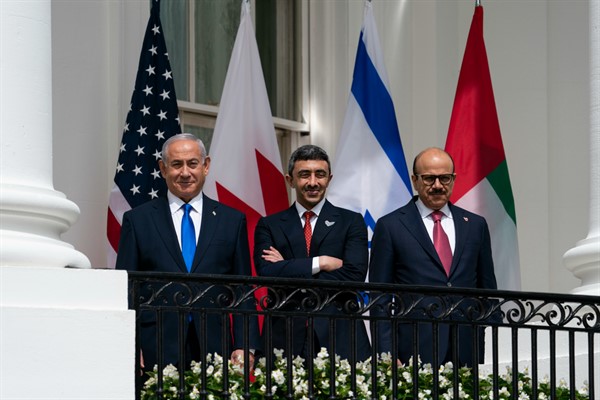The normalization agreements that the United Arab Emirates and Bahrain signed with Israel last month were billed by President Donald Trump as marking “the dawn of a new Middle East.” In reality, though, the so-called Abraham Accords merely formalize and bring into the open the pragmatic working relationships with Israel that the UAE and Bahrain have built over the past decade, based in part on both Gulf countries’ desire to reinforce their images as modern states that embrace principles of interfaith dialogue. Some other members of the Gulf Cooperation Council, a six-country regional bloc, have also cultivated unofficial ties with Israel to varying degrees, but they are likely to tread cautiously before pressing ahead with normalization deals of their own.
Oman and Qatar, for example, hosted Israeli trade representative offices in their respective capitals during the 1990s, though they were subsequently closed during periods of Israeli-Palestinian friction. More recently, the UAE, Bahrain and Saudi Arabia have drawn closer to Israel over their common interest in combating perceived regional threats from Iran and from Islamist movements after the 2011 Arab Spring uprisings. Saudi, Emirati and Israeli officials also bonded over their opposition to former President Barack Obama’s decision to engage in multilateral negotiations with Iran and the permanent members of the U.N. Security Council, plus Germany, which culminated in the Iran nuclear deal of 2015. The exception to this trend is Kuwait, where the aging leadership—it is currently ruled by the 83-year-old Sheikh Nawaf al-Ahmad al-Jaber al-Sabah, who took over recently after his half-brother, the former emir, died at the age of 91 last month—has retained its generational commitment to the Palestinian cause. Kuwait’s populist political landscape also reduces the government’s space to unilaterally make major decisions that could leave it exposed to parliamentary votes of no confidence.
Informal ties with Israel were closest in the UAE and Bahrain, so it is little surprise that these two states were the first in the Gulf to announce normalization agreements with Israel on Aug. 13 and Sept. 11, respectively. Both of their governments have invested heavily in promoting their countries as bastions of religious tolerance in recent years, partly to deflect attention away from their systematic crackdowns on domestic political opposition from Islamist and Shiite groups. Bahrain is also home to the only surviving Indigenous Jewish community in any of the Gulf states, and its leaders have long made clear their desire to develop more open and cooperative ties with Israel. Back in 2009, Crown Prince Salman bin Hamad Al Khalifa wrote in a Washington Post op-ed that, “we as Arabs have not done enough to communicate directly with the people of Israel.”

